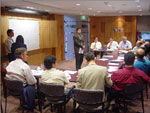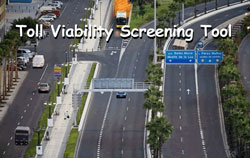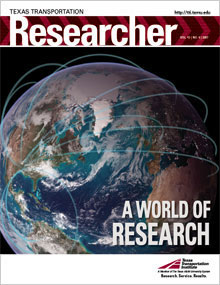 In the fall of 2004, Texas Transportation Institute (TTI) Associate Transportation Researcher Carlos M. Chang-Albitres led efforts to help improve the transportation infrastructure in the Republic of Paraguay. Along with Joe Button, TTI Senior Research Fellow, Chang-Albitres used fluency in Spanish and his transportation research background to help craft a five-year memorandum of agreement (MOA) between TTI and the Republic of Paraguay. Button signed the MOA with Public Works and Communications Minister Jose Alberto Alderete Rodríguez on behalf of then-TTI Director Herb Richardson.
In the fall of 2004, Texas Transportation Institute (TTI) Associate Transportation Researcher Carlos M. Chang-Albitres led efforts to help improve the transportation infrastructure in the Republic of Paraguay. Along with Joe Button, TTI Senior Research Fellow, Chang-Albitres used fluency in Spanish and his transportation research background to help craft a five-year memorandum of agreement (MOA) between TTI and the Republic of Paraguay. Button signed the MOA with Public Works and Communications Minister Jose Alberto Alderete Rodríguez on behalf of then-TTI Director Herb Richardson.
This groundbreaking MOA ushered in a new era of research in South America for TTI. Bolstered by the support of the Inter-American Development Bank (IDB) and United States Trade and Development Agency (USTDA), the Institute has additional project initiatives in Argentina and Peru.
Paraguay
One of the original objectives of the Paraguay agreement was to assist with the building of a major road in the El Chaco region. Fernando Orduz, an infrastructure specialist and civil engineer with IDB, led the bank’s effort to choose TTI and negotiate the MOA. IDB considered two key factors when selecting TTI—climate and expertise.
The similarity of challenges, besides the academic and technological excellence achieved by TTI, was a key factor when dealing with similar weather and geological conditions present in Texas as those existing in the El Chaco region of western Paraguay.

“When we first began the project, we observed the different problems they were facing during road construction due to climate and poor quality soils in the region,” says Button. “They needed construction specifications for that particular condition, so TTI immediately knew that we could help from the ground up. To help make this possible, IDB stepped forward to fund this five-year agreement with TTI.”
The Institute also entered into similar MOAs with Paraguay’s National University of Asuncion and the Catholic University of Asuncion. “Both universities have already conducted research in various engineering fields,” says Chang-Albitres. “These agreements will open new channels of cooperation.”
Argentina
With a growing population and improved economy, Argentina is facing some unique challenges related to highway safety and road construction and design. The Asociaci�n Argentina de Carreteras (Argentine Roads Association) and TTI will be working together to find transportation solutions in Latin America. The agreement was signed by the president of the association, Miguel Salvia, and, on behalf of TTI, Assistant Agency Director Dean Alberson.
“Argentina is interested in developing a crash testing research facility similar to what we have at TTI,” says Carlos M. Chang-Albitres.
The agreement was made at the conclusion of the Argentina Roads Safety and Traffic Congress in Buenos Aires this summer. In part, the MOA “recognizes that a collaborative effort will be of mutual benefit and will serve to establish enduring ties of cooperation.” The MOA will last for five years and is renewable.
“Argentina is serious about improving its roads and the safety of its traveling public,” says Alberson. “We are honored to work with them in this endeavor, sharing with transportation colleagues in Latin America what has worked here in the United States and applying that to the unique challenges in Argentina.”
Peru
TTI Associate Agency Director Bill Stockton and Carlos Chang-Albitres entered into an agreement with the Construction Management Institute of Peru in 2005. Workshops, publications and other means for transferring technology have been taking place since then. One of the most interesting projects is the ongoing development of an online version of the toll viability screening tool (TVST).

“Peru, like many other countries, is pursuing toll roads as a funding option,” says Stockton. “We are working with the Construction Management Institute of Peru to make the toll viability screening tool web based, and this can be used by public agencies.”
The toll viability screening tool was the result of a TxDOT funded project conducted by TTI in 2004. The purpose of the project was to provide states and other transportation entities an analytical tool that allows them to make realistic, “first-cut screening” estimates of potential revenue from toll funding.
The website was recently presented by Stockton and Chang-Albitres in a webinar sponsored by the Federal Highway Administration and the International Road Foundation that connected Argentina, Chile, Peru and the United States.
The TTI researchers involved in the activities in South America view their efforts as a way to diversify funding and research on an international scale. They also derive personal satisfaction from sharing their transportation expertise with other countries.
“The MOA with Paraguay was the first step in developing several specific research projects in cooperation with local partners to strengthen the road engineering practice in South America and to leave behind some legacy knowledge for future generations,” says Chang-Albitres. “TTI’s aim is to contribute to developing better infrastructure facilities for a better future.”
